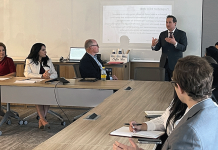In recognition of the conclusion of Women’s History Month, CalChamber today released a special edition of The Workplace podcast. In this episode, CalChamber President and CEO Jennifer Barrera speaks with California Secretary of State Shirley N. Weber, Ph.D., who reflects on the influences that shaped her career, explains why business leaders should invest their time in mentoring future women leaders, and shares advice for company leaders who are working within their organizations to encourage women leaders.
Shirley Nash Weber was nominated to serve as California Secretary of State by Governor Gavin Newsom and was sworn into office on January 29, 2021. She is California’s first Black Secretary of State and only the fifth African American to serve as a state constitutional officer in California’s 170-year history. Weber was born to sharecroppers in Hope, Arkansas during the segregationist Jim Crow era. Her father, who left Arkansas after being threatened by a lynch mob, did not have the opportunity to vote until he was in his 30s. Although her family moved to California when Weber was 3 years old, it was her family’s experience in the Jim Crow South that has driven her activism and legislative work. Weber attended the University of California, Los Angeles, where she received her B.A., M.A. and Ph.D. by the age of 26. Before her appointment, Secretary Weber served four terms as an Assembly member, representing California’s 79th Assembly District, which includes parts of the city of San Diego as well as several cities and communities in the San Diego region.
At the start of the podcast, Weber shares the legacy and example her parents set in her life. She speaks about the grit and determination of her father, who often took Weber and her siblings back to visit Arkansas, even though his safety was threatened, to teach his children not to be afraid and so that they could keep in touch with the extended family. Weber’s mother always gave whatever she could to the people around her.
“My dad used to talk about the fact that my mother would give away everything we had if she could,” Weber says.
Weber’s mother often gave meals to people in the community who knocked on her door, and prepared food for the homeless and snacks for children. Her mother believed in the Openhand Philosophy.
“She would always tell us that if you have an open hand, you might drop a penny or two along the way. But you always can give, the people can take from you and people can give to you. But if you have a closed hand, and you keep what you have, it’s guaranteed that you probably won’t drop anything, but you also won’t get anything else. And so we live with that idea, that we had to give back,” Weber says.
Weber also speaks about the importance of mentorship and how mentors should view it as a lifetime of interchange of information—it’s not just a one-year experience. When asked about advice for company leaders who want to encourage women to become leaders within their organizations, she replies that it’s important that organizations allow people to “see what’s inside.” They should be brought to the inner circle so that they can see what takes place in those closed rooms and how decisions are made because it’s oftentimes a mystery. Lastly, business leaders should “release folks to be who they are,” she says. If a woman is brought in, it’s important to not want to see her as a man in a skirt—she’s a woman and that’s what you want. We often assume that everyone sees the same thing, but they don’t.
“You know, I tell folks, oftentimes, if you want an African American, you have to release them to be African American. You have to understand that they see the world very differently, and give them the permission to see it, because in the process, they might help you see things differently,” she tells Barrera. “But equally important, you can help them see things differently themselves, so that they understand the differences that are there.”


